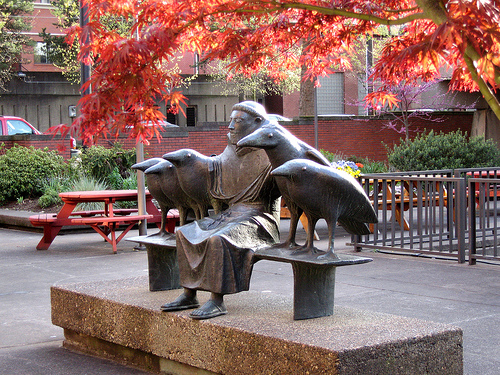

I confess that climate change is an area where my science enthusiasm wanes a bit. I have no expertise in the relevant domains; I’ve always felt I have little to add to the conversation other than to defer to those who have studied the questions in detail. I am sympathetic to the cause of reducing fossil fuel consumption regardless of climate; if we are consuming more than is being produced, that’s going to be problematic on its own terms in the long run. Still, in light of the Pope’s encyclical it feels like the time has come to at least acknowledge the ongoing conversation.
First, I encountered this commentary by Lawrence Krauss. Not unlike the message of Tomorrowland, one of Krauss’s main points is that human agency and ingenuity are up to the challenge of creating a positive future. He may be a tad pessimistic about whether we will actually seize the opportunity to realize that future, but that’s not for lack of ability or resources.
I’m inclined to agree with Krauss that solutions will likely have significant technological and economic components, if for no other reason than those instruments, along with policy, are the ones we have at present to operate on a global scale. That’s conclusion I come to because of my religious beliefs, not in spite of them. The trajectory of God’s kingdom as depicted in the Bible points towards a city, a new Jerusalem. While I don’t think that means those who prefer a pastoral life will be disappointed, I do think we can expect some form of urban environment and the associated technology. For that matter, agriculture in any form is itself a kind of technology that makes it possible for people to live in larger communities.
Ultimately, it is the living together part that I think we should take away from the Biblical story. That is the goal we should be working towards, and that is what should motivate us to care about how all people are affected by our technology, our economics, our policy, and our religion, no matter what is going on with the climate. That’s why this opening line from Krauss’ was particularly striking:
It is ironic that while the scientific community has long tried to raise warning signals and induce action to address human-induced climate change, an encyclical from the pope on this subject is being taken by many as an ultimate call to action on this urgent issue.
Surely Krauss is aware that many people consider the Pope influential; if the Pope and other religious figures had less influence, he wouldn’t feel obligated to speak out against religion so often. So why even mention it? We’re going to need the support of those who listen to the Pope to achieve global change, and some of them stand to be most strongly affected if we don’t. Why risk alienating them?


Of course, Krauss and the scientific community he mentions don’t want to alienate people. Nor does the Pope for that matter. I wonder if what is going on is something more subtle, something I probably should have realized a long time ago but never thought about before. When people claim that religion and science are in conflict, I understood that to mean religion and science make contradictory truth claims that cannot simultaneously be true, so one must be right and the other wrong. But perhaps I’ve missed the nature of the conflict. It’s not enough for science and religion to agree about truth claims; science or religion, or more accurately certain scientists and certain religious leaders, want to be the sole source of truth.
In other words, when people sense conflict between science and religion, perhaps I should understand that as a conflict over power rather than a conflict over truth. Being someone’s source of truth gives you a lot of power (something I’ve come to appreciate as a father and would certainly never exploit for amusement) so I can understand the desire to be in that position. I’m sure that scientific and religious leaders, and others as well, regularly face temptation to accumulate that kind of power. At the same time, I think one of the compelling things about Christianity is the way it works against that accumulation of power.
Jesus came to set us free. Among other things, he set us free from having another person be our conduit of truth. This was perhaps most dramatically symbolized in the tearing of the curtain setting off the Holy of Holies in the temple. Each and everyone one of us can know truth for ourselves. We may not all exercise that freedom equally, and we may not all have equal capacity to understand every aspect of the truth, but we all have that freedom. Sometimes we may need help from one another to actually learn certain truths, which creates opportunity for obtaining the power to be a conduit of truth. That potential for abuse doesn’t eliminate the role for educators, it simply means they need to be mindful of how they proceed — which is why Jesus spoke so strongly about false teachers and the consequences of abusing an educational position to accumulate power.
Theologically, I believe that God is the source of all truth, and that Jesus spoke truly when he said he was the truth, as well as the way and the life. Theologically and scientifically, I also believe in the fallibility of man, so I don’t think any one person knows that truth perfectly. Thus I don’t think only Christians have a monopoly on truth, and neither do scientists. The Bible says nothing explicitly about the greenhouse effect, while science doesn’t give us ethics for why we should care about the poor and disadvantaged (which is not to say that the only source of ethics is the Bible or religion). For global-scale problems, we are going to need global-scale solutions, and that requires acknowledging truth wherever we find it.
Andy has worn many hats in his life. He knows this is a dreadfully clichéd notion, but since it is also literally true he uses it anyway. Among his current metaphorical hats: husband of one wife, father of two teenagers, reader of science fiction and science fact, enthusiast of contemporary symphonic music, and chief science officer. Previous metaphorical hats include: comp bio postdoc, molecular biology grad student, InterVarsity chapter president (that one came with a literal hat), music store clerk, house painter, and mosquito trapper. Among his more unique literal hats: British bobby, captain’s hats (of varying levels of authenticity) of several specific vessels, a deerstalker from 221B Baker St, and a railroad engineer’s cap. His monthly Science in Review is drawn from his weekly Science Corner posts — Wednesdays, 8am (Eastern) on the Emerging Scholars Network Blog. His book Faith across the Multiverse is available from Hendrickson.

Leave a Reply